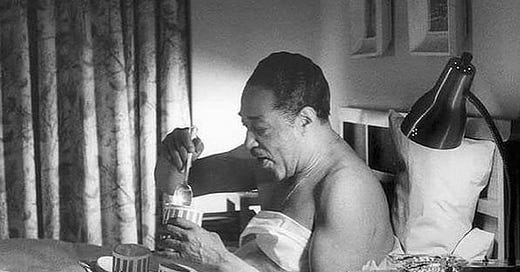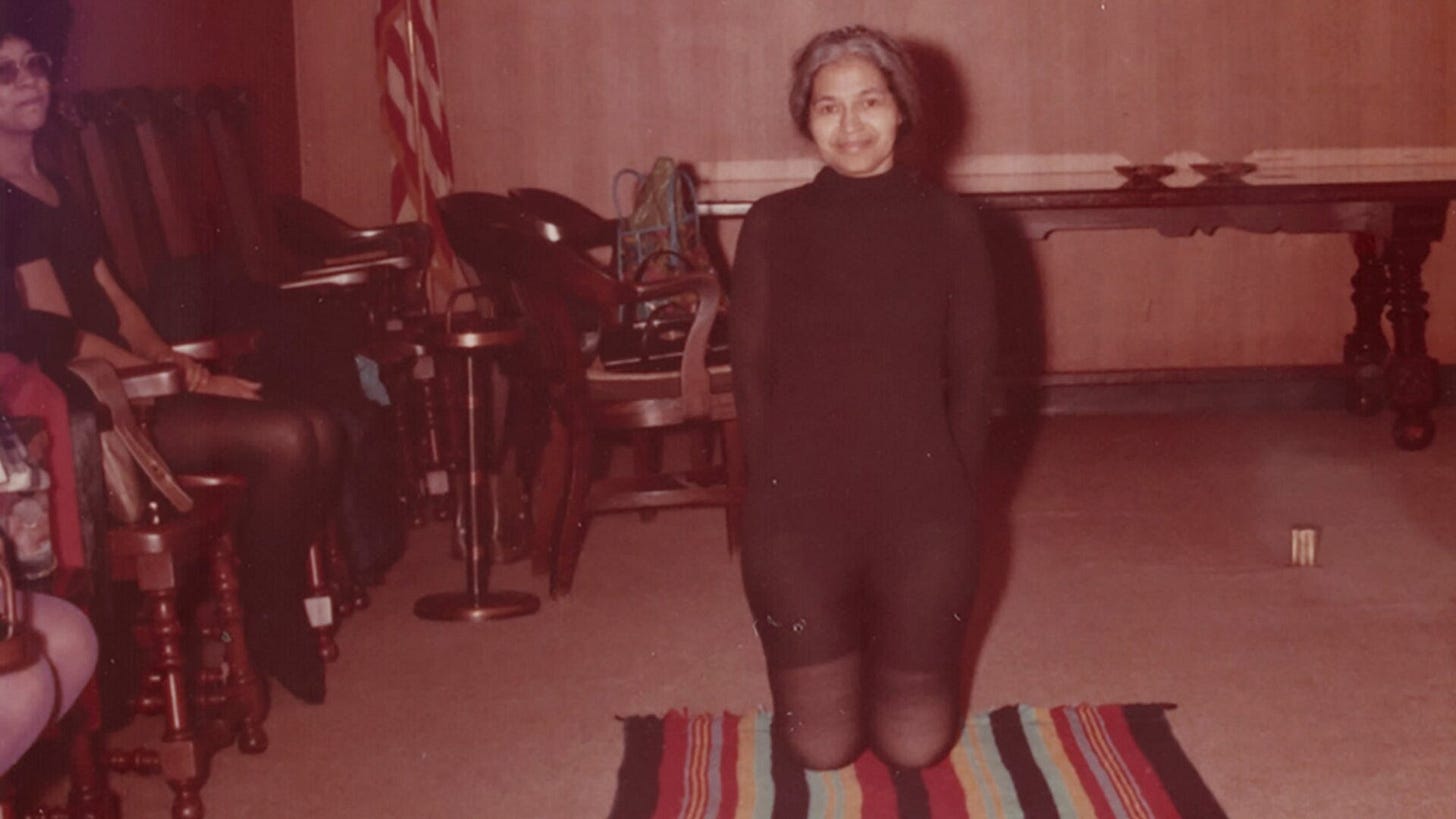Thank God for Threads and all of the mostly positive, witty and non-cubicle shenanigans we’re creating over there (my bra is definitely off in that space so you’ve been warned). There's a photograph circulating that haunts me with its perfection: Duke Ellington, the jazz maestro himself, lounging in bed surrounded by four tubs of ice cream. In our relentless pursuit of productivity and purpose, this image offers a revolutionary manifesto for 2025 and beyond.
Creatives Need More Time to Recover
The myth of the tortured artist has done us all a disservice. Here's Duke Ellington, one of the most prolific composers in history, taking an unapologetic ice cream break. In a world that demands constant creation, constant output, constant presence, the sight of a genius choosing to simply be, to indulge, to rest—is radical. The space between notes is what makes music sing, and the space between creating is what keeps creativity alive. Research backs this up: studies show that regular periods of rest can increase creativity by up to 40%, while chronic stress can reduce creative thinking by nearly 50%.
Joy is a Proper Response to Racism
In a society that expected Black pain to be performed and Black excellence to be humble, Duke Ellington's ice cream feast is an act of defiance. Audre Lorde understood this when she wrote, "Caring for myself is not self-indulgence, it is self-preservation, and that is an act of political warfare." Joy, pleasure, and indulgence are not just rights but revolutionary acts. When systems of oppression expect you to shrink, to suffer, to apologize for existing. choosing joy becomes a powerful statement.
As bell hooks reminded us, "Living a life fully dedicated to resistance and revolutionary activism can lead to burnout if we do not also attend to our need for pleasure, joy, and leisure." The historical denial of Black joy – from laws prohibiting gatherings and celebrations during slavery to modern policing of Black leisure spaces – makes moments of pure pleasure inherently political. Ellington showed us that creating beauty and experiencing pleasure are forms of resistance.
In my book"The Equity Mindset," there’s a quote from my close friend, Linara Davidson that highlights the importance of Black people claiming feeling all the feels—including the good ones: "I think that the white supremacy culture that all of us have inherited, whether we want it or not, includes this idea that in order for things to feel right, they have to feel good in our body—that it has to be non-confrontational to our body. But that's counter to what marginalized people experience on a daily basis. As a Black person, my daily survival was designed to ignore my body and instead prioritize maneuvering external relationships in ways that white people have never had to think through." When we see Ellington choosing pleasure, choosing rest, choosing ice cream, we see a radical act of reclaiming the right to feel good in one's body.
Black Rest Must Be Visualized
We rarely see images of Black people at rest, in moments of pure enjoyment, free from the burden of representation or responsibility. Or should I say…we rarely share it outside of Black spaces. This photo of Ellington is precious because it captures something often denied: the right to simply be, to take pleasure in small things, to rest without purpose. It’s as refreshing as the image of Maya Angelou cutting a rug with poet Amiri Baraka, or Rosa Parks doing yoga. The Nap Ministry's Tricia Hersey speaks to this directly: "Rest is resistance because it disrupts and pushes back against capitalism and white supremacy." Studies show that Black Americans get less sleep on average than any other racial group, with researchers linking this directly to racial discrimination and socioeconomic stress. In an era where Black excellence is often equated with constant hustle, seeing one of our greatest artists choose rest over performance matters. (I also want us to redefine “Black excellence” in the 2025 but for another blog).
Clothes Are Overrated (Hear Me Out)
There's something perfectly vulnerable about Ellington shirtless under his blanket, stripped of all pretense, surrounded by ice cream. It reminds us that we don't need the armor of fancy clothes or the validation of consumer culture to be worthy of pleasure or rest. The fast fashion industry produces 10% of global carbon emissions and often exploits workers in the Global South—the same communities that historically have been denied rest and pleasure. There's radical contentment in choosing comfort over appearance, in recognizing that we have enough.
The Pleasure Principle
The most revolutionary conversations, the most world-changing ideas, often happen in these unguarded moments; when we're just being human, sharing ice cream, and dreaming of a better world. As activist and writer adrienne maree brown notes in "Pleasure Activism," "Pleasure is a measure of freedom," and historically, the deprivation of pleasure has been a tool of oppression.
As we enter 2025, perhaps what we need isn't another productivity hack or self-improvement plan. Research from the Harvard School of Public Health shows that optimistic people live up to 15% longer, while regular moments of joy can boost immune function by up to 50%. Maybe what we need is to channel our inner Duke Ellington…to find moments of pure joy, to rest without guilt, to create space for pleasure and possibility. After all, if one of the greatest composers in history knew the value of an ice cream break, who are we to argue?
How are you prioritizing rest in the 2025?







